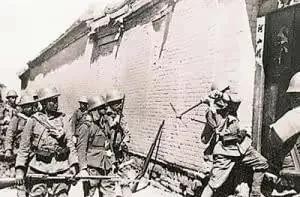In 1942, the 12th Regiment of Eastern Hebei was ambushed in the sorghum field. At this time, more than 180 Japanese soldiers drove over with 150 carts. Zeng Kelin opened fire, and the battle began. With a boom, the flames soared into the sky, the enemy was in disarray, and the Japanese puppet army panicked!
In that era of change, China in 1942 was in the deep period of the War of Resistance Against Japan. The eastern Hebei region, with its unique geographical location and strong and unyielding anti-Japanese forces, has become an important node on the battlefield.
Zeng Kelin, the commander of the 12th Regiment in Jidong, was a brave and fearless commander who led a group of like-minded soldiers to fight the Japanese army on this land.
The beginning of the story is the moment when a calm night is suddenly broken. The 12th Regiment in Eastern Hebei received information that a material convoy of 150 carts escorted by more than 180 Japanese soldiers would pass through the area where they were ambushed.
This was not only a great opportunity to destroy the enemy's supplies, but also a moment of revenge for the heinous crimes committed by the Japanese army in Panjiayu Village.
Under the command of Zeng Kelin, the fighters quietly arranged an ambush circle under the cover of the sorghum field. As soon as dawn broke, the enemy convoy entered the ambush zone in a mighty way.
At this moment, Zeng Kelin opened fire, and the artillery fire was about to break out, and in an instant, the entire battlefield turned into hell. The flames were in the sky, the explosions were incessant, and the ranks of the Japanese puppet army fell into chaos.
The climax part takes place at the moment of the charge. Under the leadership of Zeng Kelin and Yang Silu, the soldiers of the 12th Regiment in Jidong rushed down the mountain like tigers. The artillery squad first fired a few shells, which directly disrupted the formation of the Japanese puppet army, and then the machine guns and rifles of the whole regiment poured down on the enemy like a raging storm. The Japanese puppet army was overwhelmed by the sudden attack, and in the chaos, they began to trample on each other, and the scene was chaotic.
As the glimmer of dawn gradually pierced the night, the soldiers of the 12th Regiment in eastern Hebei waited in the ambush position in the sorghum field. On this day, they will carry out an important task - to ambush the passing Japanese army and the puppet army material convoy. This is not only a sabotage of the enemy's material line, but also a profound revenge for the compatriots killed in the Panjiayu tragedy.
As soon as dawn broke, the enemy convoy drove into the ambush circle. Regiment Commander Zeng Kelin carefully observed the enemy's movements, looking for the best time to open fire. When the enemy completely entered the ambush zone, Commander Zeng decisively gave the order to open fire. As soon as the artillery fire broke out, the flames and explosions immediately filled the entire battlefield. The Japanese puppet army was in disarray, and they did not expect an ambush here.
In the early days of the battle, the Japanese puppet army also tried to organize a counterattack, but was quickly suppressed by the overwhelming firepower of the 12th Regiment in eastern Hebei. Using the cover of the sorghum fields, the warriors shuttled around the battlefield like ghosts, firing with extreme precision with every shot, effectively weakening the enemy's resistance.
As the battle deepened, the 12th Regiment of Jidong began to launch an organized attack. The artillery squad's shells hit the enemy's vital points again and again, like accurate missiles. The infantry, led by Zeng Kelin and Yang Silu, launched a brave charge. They either crawled forward or made rapid assaults, each of which dealt a huge blow to the enemy.
At noon, the sun was high and the temperature on the battlefield rose sharply, but at the same time, the resistance of the Japanese puppet army was gradually weakening. The morale of the fighters of the 12th Regiment in Jidong was high, and they knew that victory was just around the corner. The fighting intensified in the afternoon, but as time went on, the organized resistance of the Japanese puppet army had almost collapsed.
At 4 o'clock in the afternoon, the dawn of victory could already be clearly seen on the battlefield. After a day of fierce fighting, the enemy's resistance was finally completely crushed. More than 180 Japanese troops were wiped out, and more than 100 puppet soldiers were killed, wounded and captured. The success of this ambush not only captured a large number of enemy weapons and supplies, but more importantly, avenged the compatriots in Panjiayu Village.
After the battle, the soldiers of the 12th Regiment in Jidong carried out a quick clean-up on the battlefield. They collected weapons and supplies from the enemy, and at the same time carried out emergency treatment of the wounded. Exhaustion was written on the faces of every warrior, but there was a glint of victory in their eyes.
While cleaning up the battlefield, the fighters found Sasaki's body. The commander of the Japanese garrison, who had committed serious crimes in Panjiayu Village, finally ended his criminal career on this battlefield. The warriors surrounded his corpse, their hearts filled with mixed emotions. They knew that although this moment could not completely heal the wounds of the villagers of Panjiayu, it at least brought them a little comfort.
As the sun set, the soldiers of the 12th Regiment in Eastern Hebei slowly left the battlefield with the joy of victory. Their figures fade away in the afterglow of the setting sun, but their victories and the spirit of fighting for justice will forever remain on the land and inspire generations to come.
